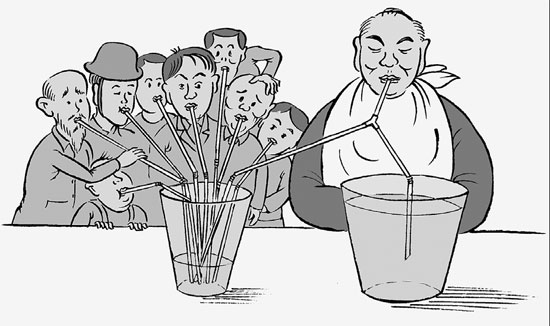
 |
"My parents make about 40,000 yuan every year but most is used to pay for daily necessities and pay off debts and not much is left to spend," he added.
His financial burden might get heavier because his younger brother is currently a senior three student in high school and is planning to go to college next year - the only way to escape poverty in traditional Chinese thinking. Zhang is ready to shoulder the responsibility.
Since the implementation of the reform and opening-up policy in the late 1970s, China has achieved great progress in its overall economic growth. But small increases in average personal incomes and income inequality are now undermining the country's sustainable development.
Official statistics show that the average personal income of Chinese citizens has been growing at a slower pace than GDP and fiscal revenue for the past three decades.
Between 1979 and 2011, China's GDP rose from 406.2 billion yuan to 47.3 trillion yuan, with an average annual growth rate of 9.9 percent. By contrast, the per capita disposable income for Chinese urban dwellers in 2011 was 21,810, representing an average annual growth rate of 7.4 percent over the same period.
The per capita income for rural residents in 2011 was a mere 6,977 yuan, less than one-third of the urban income level and only about 15 percent of the world's average level, according to data from the National Bureau of Statistics.
















 10th China Int'l Automobile Exhibition kicks off in Guangzhou
10th China Int'l Automobile Exhibition kicks off in Guangzhou


![]()
